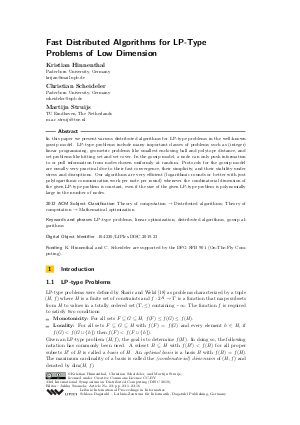Fast Distributed Algorithms for LP-Type Problems of Low Dimension
Authors Kristian Hinnenthal, Christian Scheideler, Martijn Struijs
-
Part of:
Volume:
33rd International Symposium on Distributed Computing (DISC 2019)
Part of: Series: Leibniz International Proceedings in Informatics (LIPIcs)
Part of: Conference: International Symposium on Distributed Computing (DISC) - License:
 Creative Commons Attribution 3.0 Unported license
Creative Commons Attribution 3.0 Unported license
- Publication Date: 2019-10-08
File

PDF
LIPIcs.DISC.2019.23.pdf
- Filesize: 0.63 MB
- 16 pages
Document Identifiers
Subject Classification
ACM Subject Classification
- Theory of computation → Distributed algorithms
- Theory of computation → Mathematical optimization
Keywords
- LP-type problems
- linear optimization
- distributed algorithms
- gossip algorithms
Metrics
- Access Statistics
-
Total Accesses (updated on a weekly basis)
0Document
0Metadata
Abstract
In this paper we present various distributed algorithms for LP-type problems in the well-known gossip model. LP-type problems include many important classes of problems such as (integer) linear programming, geometric problems like smallest enclosing ball and polytope distance, and set problems like hitting set and set cover. In the gossip model, a node can only push information to or pull information from nodes chosen uniformly at random. Protocols for the gossip model are usually very practical due to their fast convergence, their simplicity, and their stability under stress and disruptions. Our algorithms are very efficient (logarithmic rounds or better with just polylogarithmic communication work per node per round) whenever the combinatorial dimension of the given LP-type problem is constant, even if the size of the given LP-type problem is polynomially large in the number of nodes.
Cite As Get BibTex
Kristian Hinnenthal, Christian Scheideler, and Martijn Struijs. Fast Distributed Algorithms for LP-Type Problems of Low Dimension. In 33rd International Symposium on Distributed Computing (DISC 2019). Leibniz International Proceedings in Informatics (LIPIcs), Volume 146, pp. 23:1-23:16, Schloss Dagstuhl – Leibniz-Zentrum für Informatik (2019)
https://doi.org/10.4230/LIPIcs.DISC.2019.23
BibTex
@InProceedings{hinnenthal_et_al:LIPIcs.DISC.2019.23,
author = {Hinnenthal, Kristian and Scheideler, Christian and Struijs, Martijn},
title = {{Fast Distributed Algorithms for LP-Type Problems of Low Dimension}},
booktitle = {33rd International Symposium on Distributed Computing (DISC 2019)},
pages = {23:1--23:16},
series = {Leibniz International Proceedings in Informatics (LIPIcs)},
ISBN = {978-3-95977-126-9},
ISSN = {1868-8969},
year = {2019},
volume = {146},
editor = {Suomela, Jukka},
publisher = {Schloss Dagstuhl -- Leibniz-Zentrum f{\"u}r Informatik},
address = {Dagstuhl, Germany},
URL = {https://drops.dagstuhl.de/entities/document/10.4230/LIPIcs.DISC.2019.23},
URN = {urn:nbn:de:0030-drops-113306},
doi = {10.4230/LIPIcs.DISC.2019.23},
annote = {Keywords: LP-type problems, linear optimization, distributed algorithms, gossip algorithms}
}
Author Details
Funding
K. Hinnenthal and C. Scheideler are supported by the DFG SFB 901 (On-The-Fly Computing).
References
-
Noga Alon and Nimrod Megiddo. Parallel linear programming in fixed dimension almost surely in constant time. Journal of the ACM, 41(2):422-434, 1994.

-
Kenneth L. Clarkson. Las Vegas algorithms for linear and integer programming when the dimension is small. Journal of the ACM, 42(2):488-499, 1995.

-
Benjamin Doerr, Leslie Ann Goldberg, Lorenz Minder, Thomas Sauerwald, and Christian Scheideler. Stabilizing Consensus with the Power of Two Choices. In Proc. 23rd ACM Symposium on Parallelism in Algorithms and Architectures (SPAA), pages 149-158, 2011.

-
Martin Dyer. A parallel algorithm for linear programming in fixed dimension. In Proc. 11th Symposium on Computational Geometry (SoCG), pages 345-349, 1995.

-
Martin Dyer, Bernd Gärtner, Nimrod Megiddo, and Emo Welzl. Linear Programming. In Jacob E. Goodman and Joseph O'Rourke, editors, Handbook of Discrete and Computational Geometry, 3rd edition, chapter 49, pages 49:1-49:19. Chapman and Hall/CRC, 2017.

-
Martin E. Dyer and Alan M. Frieze. A randomized algorithm for fixed-dimensional linear programming. Mathematical Programming, 44(1-3):203-212, 1989.

-
Bernd Gärtner. A subexponential algorithm for abstract optimization problems. SIAM Journal on Computing, 24(5):1018-1035, 1995.

-
Bernd Gärtner and Emo Welzl. Linear programming - randomization and abstract frameworks. In Proc. 13th Symposium on Theoretical Aspects of Computer Science (STACS), pages 669-687, 1996.

-
Bernd Gärtner and Emo Welzl. A simple sampling lemma: Analysis and applications in geometric optimization. Discrete Computational Geometry, 25:569-590, 2001.

-
Michael T. Goodrich. Geometric partitioning made easier, even in parallel. In Proc. 9th ACM Symposium on Computational Geometry (SoCG), pages 73-82, 1993.

-
Bernhard Häupler. Analyzing network coding (gossip) made easy. Journal of the ACM, 63(3):26:1-26:22, 2016.

-
Bernhard Häupler, Jeet Mohapatra, and Hsin-Hao Su. Optimal gossip algorithms for exact and approximate quantile computations. In Proc. ACM Symposium on Principles of Distributed Computing (PODC), pages 179-188, 2018.

-
Richard M. Karp, Christian Schindelhauer, Scott Shenker, and Berthold Vöcking. Randomized rumor spreading. In Proc. 41st IEEE Symposium on Foundations of Computer Science (FOCS), pages 565-574, 2000.

-
David Kempe, Alin Dobra, and Johannes Gehrke. Gossip-Based Computation of Aggregate Information. In Proc. 44th IEEE Symposium on Foundations of Computer Science (FOCS 2003), pages 482-491, 2011.

-
Nick Littlestone. Learning quickly when irrelevant attributes abound: A new linear-threshold algorithm. In Proc. 28th IEEE Symposium on Foundations of Computer Science (FOCS), pages 68-77, 1987.

-
Abhiram G. Ranade. How to emulate shared memory. Journal of Computer and System Sciences, 42(3):307-326, 1991.

-
Jeanette Schmidt, Alan Siegel, and Aravind Srinivasan. Chernoff-Hoeffding bounds for applications with limited independence. SIAM Journal on Discrete Mathematics, 8(2):223-250, 1995.

-
Micha Sharir and Emo Welzl. A combinatorial bound for linear programming and related problems. In Proc. 9th Symposium on Theoretical Aspects of Computer Science (STACS), pages 569-579, 1992.

-
Petr Škovroň. Abstract Models of Optimization Problems. PhD thesis, Charles University, Prague, 2007.

-
Emo Welzl. Partition trees for triangle counting and other range searching problems. In Proc. 4th ACM Symposium on Computational Geometry (SoCG), pages 23-33, 1988.

